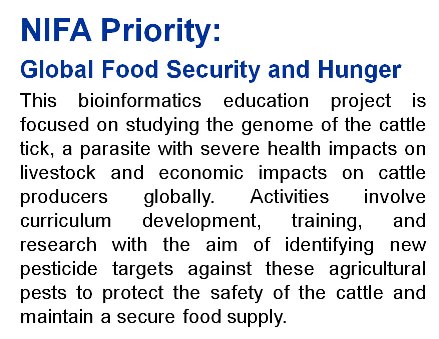Bioinformatics Education in Agricultural Science (BEAS)
One of the biggest threats to our livestock is agricultural pests, as they can act as vectors for fatal pathogens and seriously affect food security worldwide. Recently, there is an explosion of unanalyzed genetic data available to help combat cattle pests, but a severe lack of well-trained bioinformaticians has been the major hurdle to analyze this plethora of data. This bioinformatics education project is focused on studying the genome of the cattle tick, a parasite with severe health impacts on livestock and economic impacts on cattle producers globally. Activities involve curriculum development, training, and research with the aim of identifying new pesticide targets against these agricultural pests to protect the safety of the cattle and maintain a secure food supply. We will also develop educational materials based on published literature on analyses of tick genomes. These materials will be packaged into web-based modules to be utilized in three courses in statistics and bioinformatics, impacting over 200 students each year. Once tested locally, these web-modules will be distributed through the Internet for adoption by other educational institutions. Hispanic students, who make up over 75% of the UTEP student population, will be recruited to this proposed project. By engaging the students in USDA research and integrating agricultural problems into the curriculum, we will motivate them to pursue careers in agricultural science. The success of this project will be measured by the accomplishments of those students participating in research training, the extent of utilization of our educational modules, and number of impacted students pursuing agriculture-related studies and careers. This project will address the education challenge of preparing our graduates with a set of transferrable skills in addition to technical knowledge learned from traditional disciplines. We plan to achieve this purpose by engaging students in solving bioinformatics-related problems in agricultural science.


This project is supported in part by a grant (#2012-38422-19910) from the National Institute of Food and Agriculture (NIFA), the United States Department of Agriculture (USDA). The contents of this website are solely the responsibility of the authors.
